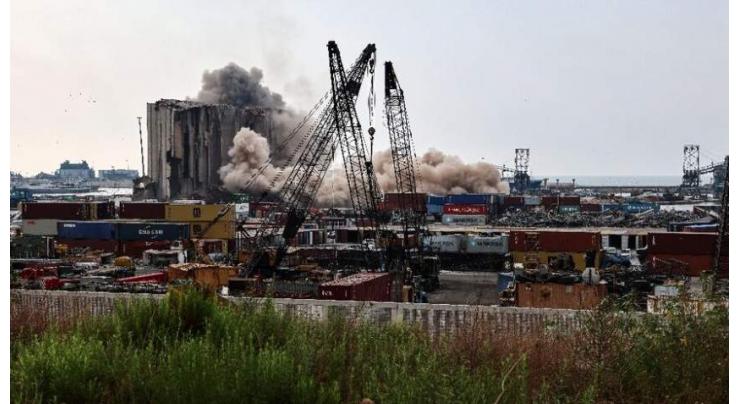
Anger, Anguish As Lebanon Marks Two Years Since Beirut Mega-blast
Muhammad Irfan Published August 04, 2022 | 09:05 PM

Lebanon marked two years Thursday since a massive explosion ripped through Beirut -- a grim anniversary marked by angry protests and the dramatic collapse of blast-damaged grain silos in a cloud of dust
Beirut, (APP - UrduPoint / Pakistan Point News - 4th Aug, 2022 ) :Lebanon marked two years Thursday since a massive explosion ripped through Beirut -- a grim anniversary marked by angry protests and the dramatic collapse of blast-damaged grain silos in a cloud of dust.
The 2020 disaster, one of history's biggest non-nuclear explosions, killed more than 200 people and decimated vast areas of the capital after a stockpile of haphazardly stored ammonium nitrate caught fire.
The protesters, many of them victims' relatives, are furious that no state official has yet been held accountable over the tragedy and an investigation into the mega-blast has been stalled amid political interference.
"When the explosion happened, we thought the truth would surface within five days," said university student Aya Qassem, joining one of multiple protest marches set to converge at the port.
"But two years have passed, and we know nothing." The huge explosion was a nightmarish moment in the chaotic history of Lebanon, which is mired in its worst-ever economic crisis marked by blackouts, runaway inflation and widespread despair.
Beirut's heavily damaged harbourside grain silos have become a grim reminder of the explosion, and the collapse of part of the structure Thursday dramatically brought back the trauma.
"I'm seeing the same sight, from almost the same place, after two years," said Lama Hashem, a 30-year-old who took part in the protest march, holding back tears.
"Its traumatic." - 'Fight for justice' - Protesters marched towards the wreckage of the silos, where fermenting grain has been smouldering in the blistering summer heat issuing clouds of smoke, after partially collapsing last week.
French civil engineer Emmanuel Durand, who monitors the silos with sensors, earlier told AFP that several more towers could come crumbling down "at any time".
"I hope that seeing the silos fall will give people the will to fight for justice," said Tatiana Hasrouty, who lost her father in the blast.
The explosion of 2020 was felt as far away as Cyprus and sowed the kind of devastation normally caused by wars and natural disasters.
It further scarred the crisis-tested population and accelerated a massive exodus that recalls the flight from the 1975-1990 civil war.
Lebanon's ruling class, accused of misrule, graft and gross negligence, has however clung firmly to power even as the people endure shortages of fuel, medicines and clean water.
"This ruling class is killing us every day," Hasrouty said.
"If we did not die in the blast, we are dying of hunger, from a lack of basic human rights." - 'A nightmare' - Power cuts last up to 23 hours a day, streets are dark at night and traffic lights out of service, leaving some districts illuminated mainly by the silo fires.
Lara Khatchikian, 51, whose apartment was badly hit two years ago, has watched the blazes, calling the sight "a nightmare".
"I have felt fear, we couldn't sleep," she said. "It takes superhuman strength to live when you are constantly reminded of the blast." The government in April ordered the silos' demolition, but this has been suspended, partially because of objections from victims' relatives who want them preserved as a memorial.
Meanwhile, the probe is also at risk of falling apart, as officials close to the powerful Hezbollah movement have curtailed the work of the lead investigator Tarek Bitar with a series of lawsuits.
A judicial official close to the investigation said judge Bitar's work had been paused since December 23.
Hezbollah, which has repeatedly accused Bitar of bias, on Thursday condemned what it described as a two-year "intense political and media campaign, which contained false accusations" against it, and called for a "fair" investigation.
UN chief Antonio Guterres on Thursday reiterated his call for an "impartial, thorough and transparent investigation into the explosion".
UN experts and groups including Amnesty International and Human Rights Watch have again appealed to the United Nations to send a fact-finding mission, saying it was "now, more than ever, clear that the domestic investigation cannot deliver justice".
Aya Majzoub of HRW said that an international investigation "may be the only hope for the millions of Lebanese people... to get the answers they deserve".
Related Topics
Recent Stories

HEC reviews curricula for environmental sciences degree programme

ICC Asia looking forward to an action-packed Asia Cricket Week

Yuvraj Singh named ICC Men’s T20 World Cup 2024 Ambassador

Greece hands Olympic flame to 2024 Paris Games hosts

Two Kyiv hospitals evacuating over feared Russian strikes

World must act on neurotech revolution, say experts

Charles & Catherine's cancer diagnoses

Champions Alcaraz and Sabalenka through in Madrid Open

King Charles to resume some public duties during cancer treatment: palace

US defense chief announces $6 bn in security aid for Ukraine

Heavy rains cause damage to Spezand-Taftan railway track

Woman stabbed in Israel, attacker killed: police
More Stories From World
-
Tennis: ATP/WTA Madrid Open results - collated
22 minutes ago -
PGA Zurich Classic of New Orleans scores
22 minutes ago -
Sudanese filmmakers shine light on war's 'silent problems'
22 minutes ago -
NFL will allow players to wear Guardian Cap helmets in games
7 hours ago -
Football: German Bundesliga table
7 hours ago -
Football: Italian Serie A result
7 hours ago
-
Football: German Bundesliga results
7 hours ago -
US troops to leave Chad in second African state withdrawal
7 hours ago -
Plastics pollution may be solved without production cap: Canada minister
7 hours ago -
Biden stalls on menthol cigarette ban fearing Black vote backlash
7 hours ago -
Champions Alcaraz and Sabalenka through in Madrid Open
7 hours ago -
6,000 French police to welcome Olympic torch amid bonus boost
8 hours ago